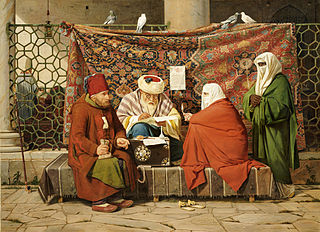Dhimmī or muʿāhid (معاهد) is a historical term for non-Muslims living in an Islamic state with legal protection. The word literally means "protected person", referring to the state's obligation under sharia to protect the individual's life, property, as well as freedom of religion, in exchange for loyalty to the state and payment of the jizya tax, in contrast to the zakat, or obligatory alms, paid by the Muslim subjects. Dhimmi were exempt from certain duties assigned specifically to Muslims if they paid the poll tax (jizya) but were otherwise equal under the laws of property, contract, and obligation.
Religious conversion is the adoption of a set of beliefs identified with one particular religious denomination to the exclusion of others. Thus "religious conversion" would describe the abandoning of adherence to one denomination and affiliating with another. This might be from one to another denomination within the same religion, for example, from Protestant Christianity to Roman Catholicism or from Sunnī Islam to Shīʿa Islam. In some cases, religious conversion "marks a transformation of religious identity and is symbolized by special rituals".

Religious pluralism is an attitude or policy regarding the diversity of religious belief systems co-existing in society. It can indicate one or more of the following:
Universalism is the philosophical and theological concept that some ideas have universal application or applicability.
People of the Book or Ahl al-kitāb is an Islamic term referring to followers of those religions which Muslims regard as having been guided by previous revelations, generally in the form of a scripture. In the Quran they are identified as the Jews, the Christians, the Sabians, and—according to some interpretations—the Zoroastrians. Starting from the 8th century, some Muslims also recognized other religious groups such as the Samaritans, and even Buddhists, Hindus, and Jains, as People of the Book.

Christianity and Islam are the two largest religions in the world, with 2.8 billion and 1.9 billion adherents, respectively. Both religions are considered as Abrahamic, and are monotheistic, originating in the Middle East.

Proselytism is the policy of attempting to convert people's religious or political beliefs. Carrying out attempts to instill beliefs can be called proselytization.

Over the centuries of Islamic history, Muslim rulers, Islamic scholars, and ordinary Muslims have held many different attitudes towards other religions. Attitudes have varied according to time, place and circumstance.

Al-Baqara, alternatively transliterated Al-Baqarah, is the second and longest chapter (surah) of the Quran. It consists of 286 verses (āyāt) which begin with the "muqatta'at" letters alif (ا), lām (ل), and mīm (م). Q2:282 is the longest single verse in the Quran.

An-Nisa' is the fourth chapter (sūrah) of the Quran, with 176 verses (āyāt). The title derives from the numerous references to women throughout the chapter, including verse 34 and verses 4:127-130.

Al-Ma'idah is the fifth chapter of the Quran, containing 120 verses. Regarding the timing and contextual background of the revelation, it is a Medinan chapter, which means it is believed to have been revealed in Medina rather than Mecca.

In Islam, nikah is a contract exclusively between a man and woman. Both the groom and the bride are to consent to the marriage of their own free wills. A formal, binding contract – verbal or on paper – is considered integral to a religiously valid Islamic marriage, and outlines the rights and responsibilities of the groom and bride. Divorce in Islam can take a variety of forms, some executed by a husband personally and some executed by a religious court on behalf of a plaintiff wife who is successful in her legal divorce petition for valid cause. Islamic marital jurisprudence allows Muslim men to be married to multiple women.
Interfaith marriage, sometimes called interreligious marriage or "mixed marriage", is marriage between spouses professing different religions. Although interfaith marriages are often established as civil marriages, in some instances they may be established as a religious marriage. This depends on religious doctrine of each of the two parties' religions; some prohibit interfaith marriage, and among others there are varying degrees of permissibility.
Religion in Israel is manifested primarily in Judaism, the ethnic religion of the Jewish people. The State of Israel declares itself as a "Jewish and democratic state" and is the only country in the world with a Jewish-majority population. Other faiths in the country include Islam, Christianity and the religion of the Druze people. Religion plays a central role in national and civil life, and almost all Israeli citizens are automatically registered as members of the state's 14 official religious communities, which exercise control over several matters of personal status, especially marriage. These recognized communities are Orthodox Judaism, Islam, the Druze faith, the Catholic Church, Greek Orthodox Church, Syriac Orthodox Church, Armenian Apostolic Church, Anglicanism, and the Baháʼí Faith.
Some movements or sects within traditionally monotheistic or polytheistic religions recognize that it is possible to practice religious faith, spirituality and adherence to tenets without a belief in deities. People with what would be considered religious or spiritual belief in a supernatural controlling power are defined by some as adherents to a religion; the argument that atheism is a religion has been described as a contradiction in terms.
Forced conversion is the adoption of a religion or irreligion under duress. Someone who has been forced to convert to a different religion or irreligion may continue, covertly, to adhere to the beliefs and practices which were originally held, while outwardly behaving as a convert. Crypto-Jews, Crypto-Christians, Crypto-Muslims and Crypto-Pagans are historical examples of the latter.
The Sword Verse is the fifth verse of the ninth surah (at-Tawbah) of the Quran. It is a Quranic verse widely cited by critics of Islam to suggest the faith promotes violence against pagans by isolating the portion of the verse "kill the polytheists wherever you find them, capture them".
[9:5] But once the Sacred Months have passed, kill the polytheists wherever you find them, capture them, besiege them, and lie in wait for them on every way. But if they repent, perform prayers, and pay alms-tax, then set them free. Indeed, Allah is All-Forgiving, Most Merciful.[Quran 9:5]
The term Abrahamic religion groups three of the major religions together due to their historical coexistence and competition; it refers to Abraham, a figure mentioned in the Hebrew Bible, the Christian Bible, and the Quran, and is used to show similarities between these religions and put them in contrast to Indian religions, Iranian religions, and the East Asian religions. Furthermore, some religions categorized as "Abrahamic" also share elements from other categories, such as Indian religions, or for example, Islam with Eastern religions.

An infidel is a person who is accused of disbelief in the central tenets of one's own religion, such as members of another religion, or irreligious people.

In Islam, the permissibility for Muslims to engage in interfaith marriages is outlined by the Quran: it is permissible, albeit discouraged, for a Muslim man to marry Non-Muslim women as long as they are identified as being part of the "People of the Book" and it is not permissible for a Muslim woman to marry a Non-Muslim man. Thus, traditional interpretations of Islamic law do recognize the legitimacy of a Muslim man's marriage if he marries a Non-Muslim woman, but only if she is Jewish or Christian. On the other hand, a Muslim woman may not marry a Non-Muslim man. Additionally, it is required in Islam that the children of an interfaith marriage be Muslim.








